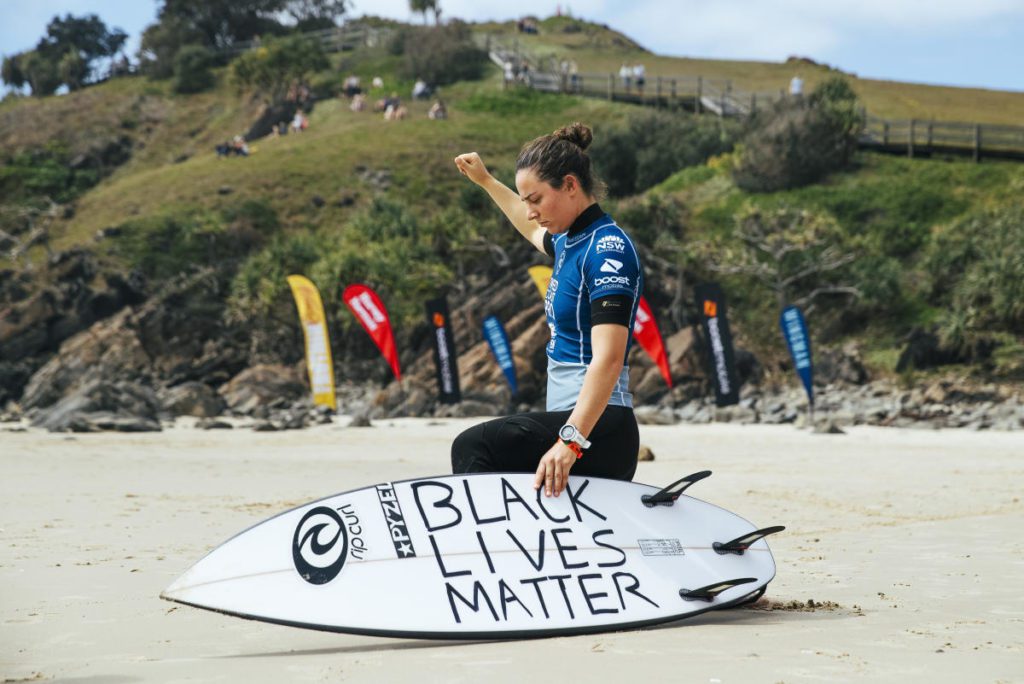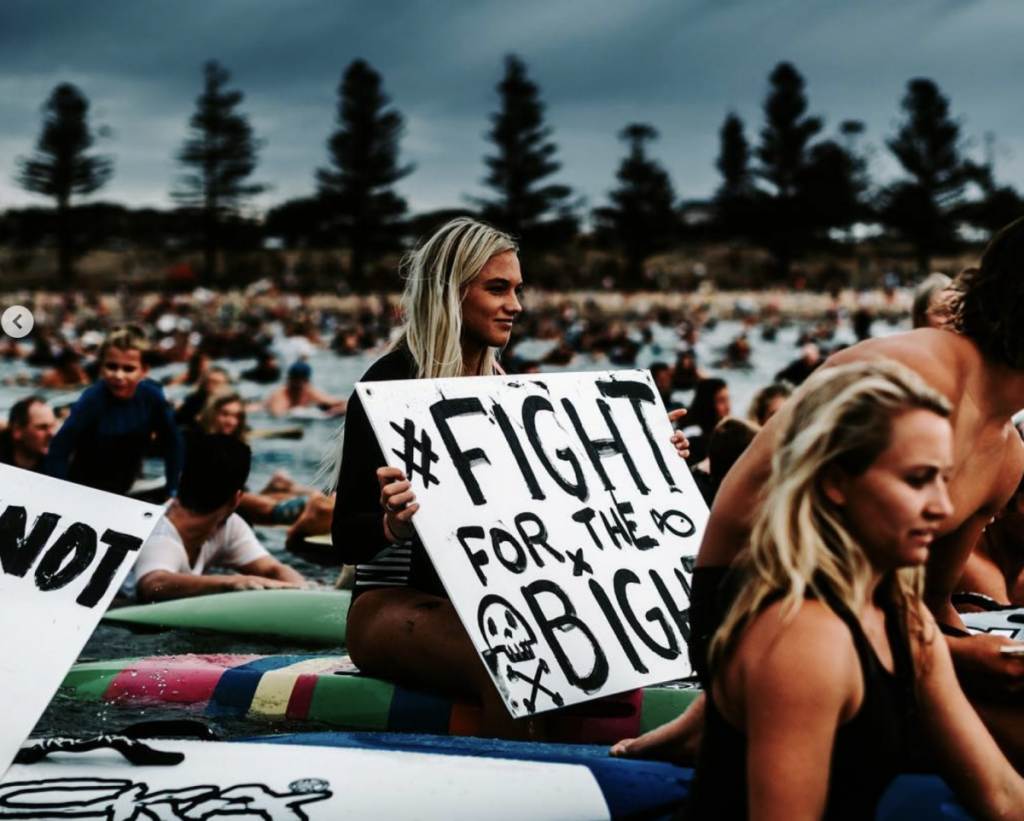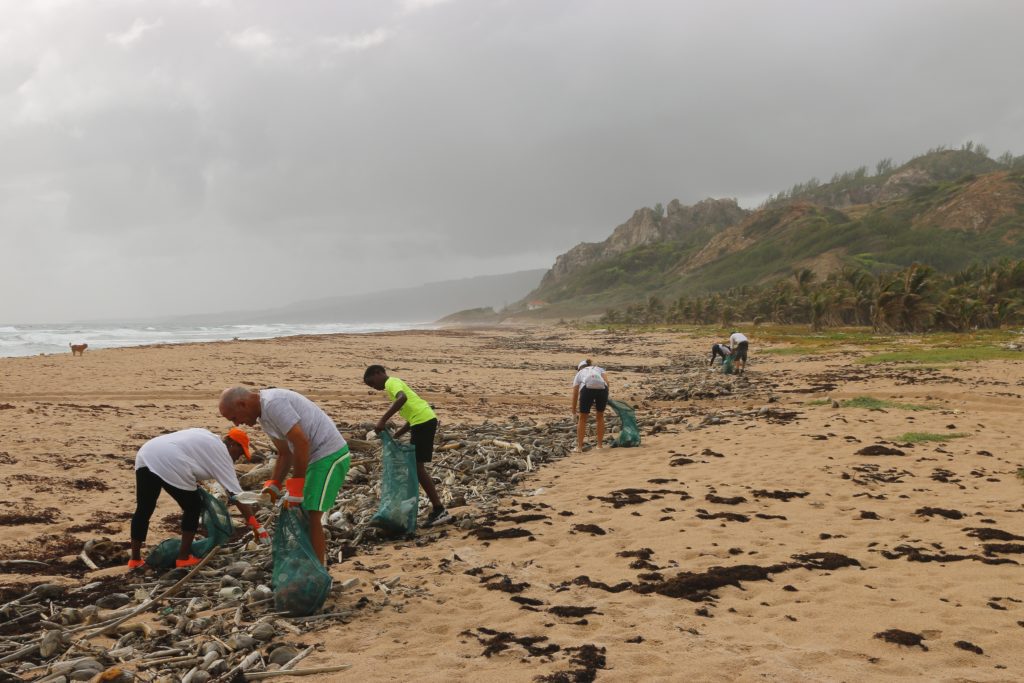Surfers Can (Help) Change The World
Four surf-based activists explain why, and how, surfers can get politically involved.
Editor’s Note: This article was originally intended for Stab Premium, but given the importance of its content, we decided to open it up to everyone. Enjoy.
There was lunacy in Washington that afternoon.
An agitated collective, aroused from a recent speech by Trump, gathered at the steps of the U.S Capitol.
Angry and disillusioned.
Skirmishes with capitol police began as apprehensive pushes and shoves and impotent kicks, intended to prod the boundaries of law enforcement rather than inflict bodily harm.
Footage aired on TV of a large man placing a right hook onto the jaw of a flustered cop who scuttled away in fright.
Insurrection Day, they called it.
Another example.
Extinction Rebellion. The ‘politically non-partisan movement’ that uses ‘nonviolent direct action and civil disobedience’ to force action on climate change.
Activists from the Australian ER branch have had a particularly illustrious year by dumping cow poo at politicians’ doorsteps, glueing themselves to roads, conducting mock funeral processions with burning koala effigies, carrying fake corpses through streets and blocking busy intersections with coffins.
It justifies its civil disobedience with a promise of far greater societal inconvenience once global warming really starts ramping up.
But tell that to the irate mother stuck in a three-hour traffic jam while her child blows his gasket in the backseat due to a bladder the size of an over-inflated balloon thanks to the three extra cups of lime cordial he dunked on the sly at daycare.
Has Extinction Rebellion forced any change? Did Insurrection Day achieve anything at all?

I use the above examples not to attack those involved, but to provide a demonstration of the actions people will take when they believe deeply enough in their cause.
Which is where surfers come in. Or rather, don’t come in. Or rather, perhaps don’t come in as often as they could. Or should.
Surfers, generally speaking, tend to stay well clear of political activism.
Why is that?
Why are we so repulsed by politics even when it involves matters close to heart?
When did we become so afraid of disagreement, of listening to another’s point of view?
A minefield of questions.
In this post-truth world where facts are debatable and one plus one doesn’t necessarily equal two, it’s more important than ever to weigh in on public debate that is so often saturated by extreme voices.
To assist with such questions are the line-up of names below. All are surfers, and equally as important, all know their way around important issues. You may not agree with their views, and that is OK. They are merely advocating the potential of our surfing collective, and highlighting the sorts of outcomes that are within our grasp if we choose to demand them.
Sean Doherty |@seano888 | Surfing World owner, Patagonia staffer, Surfrider Foundation Australia chair.
Lauren Hill | @theseakin | Writer, documentary maker, podcaster, author.
Peter Whish-Wilson | @senatorsurfer | Australian Senator, Greens Party member, environmental campaigner.
David Rastovich: Environmental campaigner, Patagonia ambassador, permaculturist, creator of good vibes.

SURFERS SPEAKING OUT
In September 2020, Tyler Wright provoked opinion as she planted knee in sand for 439 seconds (one second for every First Nations person in Australia who has lost their life in police custody since 1991) at the Tweed Coast Pro to show support for Black Lives Matter. Tyler was both attacked viciously and praised warmly through various platforms.
It raises questions relevant to us all. How much time and effort do we spend engaging in local, state, national or international issues? If we’re not responsible for shaping the communities in which we live, then who is? As surfers, why aren’t we engaging more with the world around us?
SD: Surfers are pretty self-absorbed and most crew will only turn up or speak out when something directly affects them or their wave count in some way. Politics is this thing that happens far away, done by people who look nothing like surfers. Most crew won’t care about anything political until there’s a gas rig in front of their house or their house gets sold to a negatively geared investor who puts the rent up $400 a week.
LH: We think of necessity as the mother of invention, and I think that might also be true of activism, in many cases. Mainstream surf culture, as we know it today, was founded and is perpetuated primarily by those in peak privilege: boy-ish, white, middle to upper-middle class, heteronormative guys from Southern California (and some Australians). These people haven’t stepped up on issues like BLM or gay marriage because they probably haven’t felt personally interested, responsible or engaged with those issues. Because they don’t feel affected by them.
PWW: Speaking out individually or as an organisation, trying to promote change has invariably attracted controversy. There are strong diverging opinions and political agendas afoot on many social issues, which means you cop shit — loads of it potentially. The opinion of a high-profile surfer — a professional athlete in the public eye — invariably faces greater scrutiny than that of other people. As someone who speaks publicly on many issues, I can relate to the expectation to be 100% accurate and articulate about an issue 100% of the time.
SURFING PLATFORMS SPEAKING OUT
In October 2020, Surfer Magazine publicly backed Biden/Harris in the presidential election, unleashing a torrent of abuse directed squarely at them. Among the haters, there was a loud criticism of Surfer for veering into the spooky waters of politics, which funnily enough wasn’t a concern for those who agreed with the choice of candidates.
‘Keep politics out of surfing’ are words that appeared in more than one social media comment.
A vague line of acceptability seems to have developed over time for what a surfing platform may and may not publish. Any discussion of politics is seen as wading too far away from pure boardriding.
Which is fine, except that surfing platforms often cover issues outside of surfing.
Environmental issues aren’t surfing.
Fashion isn’t surfing.
Surf charities aren’t surfing.
Sharks aren’t surfing.
Past world champions buying property isn’t surfing.
Financial feats of industry insiders aren’t surfing.
Musicians and artists aren’t surfing.
Surfers turning to soft porn isn’t surfing.
And yet you’ve probably read about them all.
So, should surfing platforms stay away from political issues?
SD: A lot of crew surf to escape the real world. Literally nobody paddles out into the lineup and starts talking about Morrison or Trump or climate policy or whatever. However, surf media isn’t surfing. It’s media, and the media talks about all sorts of shit, so why not occasionally politics? I think most guys who use the ‘keep politics out of surfing’ line use it when they disagree with the political point that is being made.
LH: Surfing means so many different things to each of us. In my peripheral corner of the surf experience, ‘keep politics out of surfing’ is not at all prevalent.
PWW: As surfing has become more popular it has attracted a wide variety of personalities, and so not all are going to fit the traditional mould — and this is a good thing if you’re a woman, BIPOC, or basically anyone that’s not a blonde-haired, blue-eyed, abled-bodied, young cisgender male from the US or Australia. I can’t help but feel keeping politics out of surfing favours those who conform to, and want to promote, the traditional surfer stereotype. Maybe there is a subconscious romanticism or motivation to protect this historical, but I think largely artificial, narrative.
DR: My direct attempts of trying to include more of ‘the surfers experience’ in our media, such as ecological info, has been met with a lot of ambivalence. It seems to me that a lot of people who surf, who are also attached to their phones and computers, like to go to magazines and websites for escapism and to indulge in the simple pleasure of surfing. Our media is not a place that people who surf want to go to for much more than surface-level wave riding material. Surfers, on the other hand, would be too deep in love with life and surfing to be bothered reading my silly words about it on a website like this.
SHIFTING RESPONSIBILITIES
Businesses are saying their piece about the world around them, louder and more often. QANTAS CEO, Alan Joyce, despite constantly aggravating many Australian, mostly conservative, politicians, readily speaks up on issues which have little to do with flying planes, and in the process, likely pisses off many of his frequent flyers.
Is there a growing responsibility for surfers, surfing platforms and corporations to voice their reasoned opinions?
PWW: I’ve spent decades of my life crusading on environmental and social issues, so of course I’m going to say yes. But at the same time my personal experience makes me recognise it’s a minefield out there, so it’s got to be done the right way. It can’t appear as ‘virtue signalling,’ or as being done to deliberately cause controversy or to simply attract attention.
LH: Beyond the (mostly) curated facade of WSL competitive surfers, I’ve witnessed lots of surfers speaking up on issues of importance to them. I guess that’s why Tyler Wright’s alliance with the BLM movement, and her inclusion of the Progressive Pride flag on her jersey this season, were such show stoppers. She stepped out of the box that most pro surfers are expected to adhere to.
DR: Surfing in Australia has, perhaps, a degree of cultural sway on how the masses perceive something related to waves, water and the coast. We can direct that at times with effect, and we certainly should when it comes to anything coastal that could diminish life for all. Even though a lot of us, myself included, do not have academic backgrounds, we have direct experience and knowledge gained by a life embedded in the coast. We have a valid voice, one that we should share when the coastal ecology is threatened. The technocratic bureaucratic person in a sealed office staring at a screen from nine to five would surely benefit from an encounter with a person containing the lived knowledge that an embedded surfer has about their home stretch of coast.

SURFERS ARE POWERFUL
The three main political parties in Australia – Labor, Liberals, Nationals – have roughly 180,000 members between them. Compare that to the estimated 675,000 people in Australia who consider themselves surfers.
In what areas do surfers hold the biggest clout when it comes to issues?
SD: Local issues are a good starting point. Don’t want the local council building the Berlin Wall at your local beach to combat beach erosion? Turn up at a council meeting — if you don’t turn up, that decision is going to be made without you, by someone who sees your beach very differently to you. Collectively, surfers have a bit more power than they probably realise. Politicians love cool-by-association, and on the flipside of that they worry about surfers turning on them and publicly calling out their bullshit. You’d be surprised how closely they watch it.
LH: On any issue where passion meets personal experience.
PWW: Naturally, the environment, but more specifically: stopping new seismic testing, oil and gas drilling off our coasts and in our oceans, working on solutions to marine plastic pollution, stopping inappropriate coastal development, and most significantly and more broadly, promoting the need for radical emissions reductions to tackle climate change. Given the sad state of the Great Barrier Reef and other oceanic ecosystems, all surfers should be advocating and voting for real climate action, like opposing all new fossil fuel projects.
DR: Anything, and everything coastal. From the headwaters of rivers that eventually meet some of our most cherished waves, to the offshore currents that carry migrating fish, marine mammals and seabirds.

GETTING INVOLVED IS EASIER THAN YOU THINK
But, how do you go about it?
SD: Vote, and walk in knowing exactly who you’re voting for and why. There’s no perfect political party or candidate, so vote for the least-worst option, and put the worst option last. Vote the assholes out.
LH: Sit down for a good chat with your family, or a good friend, and talk about what you care about. Verbalise what matters to you and then brainstorm how you can help to protect those things. For our family, we really value the spaciousness of one of our local beaches. It means so much to us to be able to know that we’ll be able to surf with dolphins, see nesting shorebirds, and to feel like we’re in a still-wild space.
PWW: The low-hanging fruit is to join the Surfrider Foundation. I’m an ex-national board member but they’re not political and they do a bloody good job protecting our oceans. They come to Canberra and they lobby hard, as they do in other countries. Plenty of other NGOs are great too: Sea Shepherd and the Wilderness Society to name just two. At a more local level, Landcare and Coastcare groups are always looking for volunteers. Taking action makes you feel good and breeds optimism. Also, share your views with mates and get respectful conversations going. Don’t be afraid of facing controversy; you always sleep well at night knowing you’re doing the right thing. Lastly, choose who you vote for wisely. It’s important to realise every environmental and social problem is first and foremost a political problem.
DR: Localise! It’s time for us to properly enact localism. Not the silly territorial bullshit that sees lots of privileged white fellas thinking they own a place because they’ve been surfing there a few decades – I mean localising our attention. Grow the food we eat locally. Only eat the fish and meat that is available locally. Invest locally with your dollars. Focus on local social and ecological problems. It’s important to know of the issues in other countries, but it’s a tactic of big industry to keep us overwhelmed by the broad stories so we feel disempowered and don’t do anything.













Comments
Comments are a Stab Premium feature. Gotta join to talk shop.
Already a member? Sign In
Want to join? Sign Up